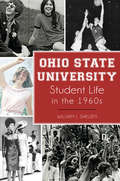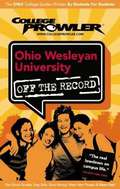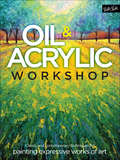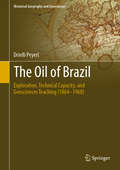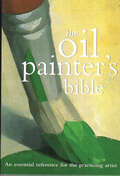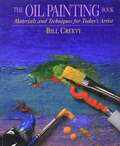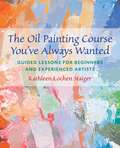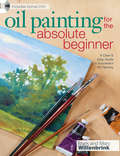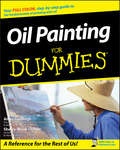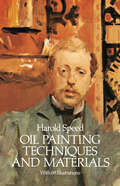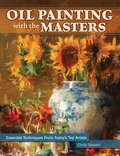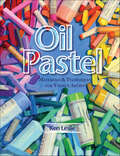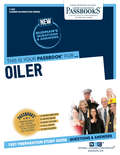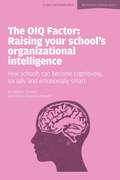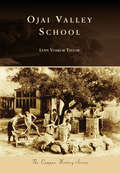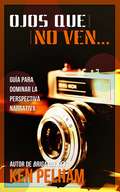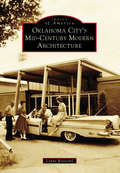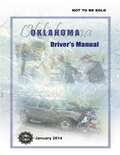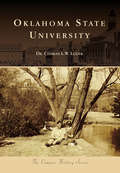- Table View
- List View
Ohio in the United States
by Zimmer Jarrett KilloranOhio in the United States will help you master Ohio's Fourth Grade Learning Standards in social studies. In the activities in this book, you will learn about the geography of Ohio, the main events that led to the settling of Ohio, and some of the challenges the people of Ohio have faced since achieving statehood. You will also learn about Ohio's diverse ethnic heritage and the importance of respecting the traditions and achievements of others. You are about to set off on an exciting journey in which you will travel through 28 activities. Each activity has been designed to provide you with an opportunity to cooperate, discuss, brainstorm, debate, research, and learn what you need for passing the Fourth Grade Ohio Achievement Test in Social Studies.
Ohio State University Student Life in the 1960s
by William J. ShkurtiStudents entering Ohio State University in the 1960s enjoyed a period of unprecedented prosperity and expanding freedom for young people. They partied in togas and twisted the night away. They gathered at Larry's, the Bergs and the BBF. They cheered on a national championship football team and grooved to folk singers, folk rockers and acid rockers, many of whom visited campus. They donned bold and sometimes outrageous new styles in clothing and bonded together as part of a cultural revolution unmatched before or since. Join author and OSU alum William J. Shkurti for a magical mystery tour through a decade when being young and in college meant you had a ticket to ride.
Ohio Wesleyan University (College Prowler)
by Evan Matthew ReasNo university affiliations. No half-truths. No out-of-touch authors who haven't been in school for decades. A class project turned company, College Prowler produces guidebooks that are written by actual college students and cover the things students really want to know. Unlike other guides that jam everything into a five-pound book and devote only two pages to each college, our single-school guidebooks give students only the schools they want and all the information they need. From academics and diversity to nightlife and sports, we let the students tell it how it is. In addition to editorial reviews and grades for 20 different topics, more than 80 percent of each guide is composed of actual student reviews of their school. Whether readers are looking for "Best and Worst" lists, "Did You Knows?" or traditions, College Prowler guides have it all. Our books are the only place for local slang, urban legends, and tips on the best places to find a date, study, or grab a bite to eat.
Oil & Acrylic Workshop: Classic and Contemporary Techniques for Painting Expressive Works of Art
by Kimberly Adams Bridget Skanski-Such Yiqi LiCreate colorful works of art using a variety of painting techniques with this guide featuring classic tools and modern twists.In Oil & Acrylic Workshop, impressionist painter Kimberly Adams teaches you to harness the creative power of both traditional and contemporary painting tools to create textured, vibrant, and colorful works of art. Whether you're an aspiring or established artist, you will relish setting aside the paintbrush in exchange for the palette knife, sponges, and even your fingers! This book comes packed with techniques for working with oil and acrylic, as well as color theory and approachable step-by-step projects. Featured projects explore the art of creating landscapes, mastering animals, painting delicate flowers, and much more.
The Oil of Brazil: Exploration, Technical Capacity, and Geosciences Teaching (1864-1968) (Historical Geography and Geosciences)
by Drielli PeyerlThis book investigates the role of the National Petroleum Council (CNP) and especially of Petrobras in the construction and shaping of courses in Geosciences, as part of the historical process of the search for and exploration of oil, which began in Brazil in 1864 and ended in 1968 with the discovery of the first offshore well.The book explores the history of the discovery of oil in Brazil together with the historical development of oil research and geosciences in Brazil. It also elucidates significant events and developments which occurred between 1864 and 1968 such as the foundation of the Ouro Preto Mining School, the foundation of the CNP and Petrobras and other scientific societies and universities and their contributions to the formation and constitution of geosciences in Brazil. This book also discusses the massive investments by CNP and Petrobras in technical and scientific research for oil exploration in the Brazilian territory.This unique book appeals to scientists, students and professionals in geosciences, history and related fields.
The Oil Painter's Bible: An Essential Reference for the Practicing Artist (Artist's Bibles Ser.)
by Marylin ScottA clear, beautifully illustrated reference guide to materials, color, techniques, subjects, and more.Oil painting can seem like a challenge when you start out, but you can learn how to use and enjoy one of the most satisfying painting mediums with this well-organized, handy guide. It contains essential information on the materials, equipment, and techniques for creating accomplished works in oils. Step-by-step sequences show how to paint a range of themes, from still life to portraits and landscapes, with advice on more difficult subjects.Packed with helpful illustrations and an inspiring gallery of artworks, The Oil Painter’s Bible also includes suggestions for presenting your finished paintings and how to go about getting your work seen and exhibited.
The Oil Painting Book: Materials and Techniques for Today's Artist (Materials and Techniques)
by Bill CreevyWithout equal anywhere in print today, this is the most complete guide to oil painting materials, and how to use them to derive best results from the medium.
The Oil Painting Course You've Always Wanted: Guided Lessons for Beginners and Experienced Artists
by Kathleen StaigerEverything you always wanted to know about oil painting...but were afraid to ask. Or maybe you weren't afraid--maybe you just didn't know what to ask or where to start. In The Oil Painting Course You've Always Wanted, author Kathleen Staiger presents crystal clear, step-by-step lessons that build to reinforce learning. Brush control, creating the illusion of three dimensions, foolproof color mixing, still-life painting, landscapes, and portraits--every topic is covered in clear text, diagrams, illustrations, exercises, and demonstrations. Staiger has taught oil painting for more than thirty-five years; many of her students are now exhibiting and selling their paintings. Everyone from beginning hobby painters, to art students, to BFA graduates has questions about oil painting. Here at last are the answers!
Oil Painting Essentials: Mastering Portraits, Figures, Still Lifes, Landscapes, and Interiors
by Gregg KreutzAn essential guide to the oil painting techniques that will allow artists to master a variety of subjects, including figures, portraits, still life, landscapes, and interiors.Many painters limit themselves to one type of subject matter, but in Oil Painting Essentials, artist and art instructor Gregg Kreutz shows how a multi-genre approach can dramatically improve your painting skills. Arranged by category, each chapter covers both the essentials specific to that subject matter and those that apply to all genres. Through step-by-step lessons and examples from his own oil paintings, Kreutz shows how you can strengthen your skillset for one genre by painting in another. This comprehensive exploration of the conceptual and practical issues behind oil painting provides all of the tools and encouragement you need to successfully take on any type of oil painting.From the Trade Paperback edition.
Oil Painting For The Absolute Beginner: A Clear & Easy Guide to Successful Oil Painting (Art for the Absolute Beginner)
by Mark WillenbrinkThe quick-start guide to great results! Oil painting doesn't have to be rocket science, although some books on the subject make it seem that way. Filled with encouraging, easy-to-follow instruction, Oil Painting for the Absolute Beginner is a no-fear, no-experience-required guide to enjoyable painting and happy results. Focusing on the needs of the first-time painter, this book covers everything from selecting brushes and setting up your palette to key principles of color and composition, presented in a way that moves you confidently from first strokes to finished paintings. Mini demonstrations break down fundamental painting techniques in a clear, common sense way 12 step-by-step painting projects progress from simple landscapes, still life and flower paintings to more challenging subjects, such as animals, seascapes and portraits The bonus DVD-workshop features the author creating two paintings from start to finish You'll learn tricks for keeping the greens in your landscapes looking fresh, advantages to working with water-soluble oil paints, simple tips for dynamic compositions and other expert advice to make your introduction to oil painting the beginning of a beautiful friendship.
Oil Painting For Dummies
by Anita Marie Giddings Sherry Stone CliftonNobody ever said that oil painting was easy. But it gets much easier and a lot more fun when you follow a step-by-step approach that starts you off on the right foot, helps you build your skills one at a time, and gives you plenty of exercises to develop your craft. That's what you'll find in Oil Painting For Dummies.Completely free of arty jargon, this full-color guide has all the hands-on instruction you need to master the basics. You'll see how to plan a painting, build an image in layers, mix colors, and create stunning compositions. You'll also find everything you need to know about oil paints, solvents, and pigments; brushes, palettes, and painting surfaces; and how to keep costs down at the art supply store. Discover how to:Choose the right suppliesSet up your studio and care for your equipmentHandle your materials safelyDevelop your design and composition skillsMake practice sketches and studiesUse broken stroke, dry brush, glazing, scraffito and other brush strokesTry out different compositionsMix any color you wantSimplify tricky still-life subjectsPaint landscapes and common objects out doorsPaint portraits and the human formComplete with handy color chart, basic materials list, and a very useful viewing square, Oil Painting For Dummies is the fun and easy way to discover your inner artist!
Oil Painting Techniques and Materials
by Harold Speed"In any exhibition of amateur work . . . it is not at all unusual to find many charming water-colour drawings, but . . . it is very rarely that the work in the oil medium is anything but dull, dead, and lacking in all vitality and charm." -- Harold SpeedSuch provocative assertions are characteristic of this stimulating and informative guide, written in a highly personal and unique style by a noted painter and teacher. Brimming with pertinent insights into the technical aspects and painting in oils, it is also designed to help students perfect powers of observation and expression.Harold Speed has distilled years of painting and pedagogical experience into an expert instructional program covering painting technique, painting from life, materials (paints, varnishes, oils and mediums, grounds, etc.), a painter's training, and more. Especially instructive is his extensive and perceptive discussion of form, tone, and color, and a fascinating series of detailed "Notes" analyzing the painting styles of Velasquez, Reynolds, Gainsborough, Franz Hals, and Rembrandt.Nearly 70 photographs and drawings illustrate the text, among them prehistoric cave paintings, diagrams of tonal values, stages of portrait painting, and reproductions of masterpieces by Giotto, Vermeer, Ingres, Rembrandt, Titian, Reynolds, Gainsborough, Hals, Giorgione, Poussin, Corot, Veronese, and other luminaries. In addition to these pictorial pleasures, the author further leavens the lessons with thought-provoking opinion.Clear, cogent, and down-to-earth, this time-honored handbook will especially interest serious amateurs studying the technical aspects of oil painting, but its rich insight into the mind and methods of the artist will enlighten and intrigue any art lover.
Oil Painting with the Masters: Essential Techniques from Today's Top Artists
by Cindy SalaskiMaster the art of oil painting with instruction on key topics and techniques such as materials, observation, references, forms, composition, color palettes, mixing colors, underpainting, working in layers, light effects, painting on location, textures and more from ten contributors, including beautiful gallery images of finished works.You will enjoy producing better artworks and getting professional-looking results by studying the methods of today's experts, such as Laurie Kersey, Camille Przewodek, Albert Handell, Kevin MacPherson, Phil Starke, Marc Hanson and more. These award-winning contributors have exhibited around the world and have distinguished publishing histories with F+W Media and others.
Oil Pastel: Materials & Techniques for Today's Artist
by Ken LeslieFinally back in print for a new generation of artists, Ken Leslie's Oil Pastel is the definitive instructional resource on this wonderfully rich and versatile medium. Vibrant and portable, oil pastels are ideal for making quick sketches, producing stunning finished works, and make a great auxiliary tool for artists working primarily in other media. Boasting an astonishing array of color, value, and texture, oil pastels can be layered, scraped, washed, blended, and scumbled to achieve a seemingly endless variety of effects ranging from delicate lines to gooey, impasto crusts. Easily the most comprehensive oil pastel technique book available, Ken Leslie's Oil Pastel: Materials and Techniques for Today's Artist will teach you everything you need to know to create striking work that is authentically yours. Skipping over the flashy tricks and gimmicks that palely imitate true artistic skill, Ken dives headlong into a lively and engaging discussion of every aspect of the medium. With over 40 years' experience as a beloved teacher and collaborator, it's no wonder that every page of this book is jam-packed with substance and detail! Meticulous step-by-step demonstrations that accompany the sections on technique will show you how to use your pastels to achieve nearly any effect you desire. Ken can even teach you how to get a bright yellow to cover black! You will also have the chance to explore experimental approaches to oil pastel painting including, mixed media, 3-D constructions, unusual paper shapes, working with molten pastels, and much more. Perfect for all skill levels, Oil Pastel's thorough overview of color theory and basic painting techniques will help beginners get off to a strong start while advanced readers will surely delight in learning to make custom homemade pastels and new handling techniques. Ken Leslie's exciting and supportive writing style will have you paging through this book time and time again for tips, reminders, and lessons you missed the first time around! With color images of technical demonstrations, comparisons, the author's work, as well as the work of over 40 other artists, Oil Pastel: Materials and Techniques for Today's Artist truly has something for everyone.
Oiler: Passbooks Study Guide (Career Examination Series)
by National Learning CorporationThe Oiler Passbook® prepares you for your test by allowing you to take practice exams in the subjects you need to study. It provides hundreds of questions and answers in the areas that will likely be covered on your upcoming exam, including but not limited to: lubrication and maintenance of electro-mechanical power plant, pumping and construction equipment; proper application of lubricating greases and oils; proper use of tools and lubricating devices; safety; reports; and more.
The OIQ Factor: Raising Your School's Organizational Intelligence: How Schools Can Become Cognitively, Socially and Emotionally Smart (World Class Schools)
by Ochan Kusuma-Powell William PowellThis fascinating book, written by two experts in school improvement, is for teachers and school leaders who are looking for ways to raise the organizational intelligence quotient (OIQ) of their classrooms and their schools. It is ideal for those who perceive themselves as the facilitators of learning - for students, for colleagues and for themselves. If schools are to be transformed and transformative, teacher-learners will lead the way. Simplistic and superficial approaches to improving student learning simply don't work. School improvement isn't a technical challenge; it is an adaptive one. It requires a change not just in behaviors and skills, but in values, beliefs and even identity.
The OIQ Factor: Raising Your School's Organizational Intelligence: How Schools Can Become Cognitively, Socially and Emotionally Smart (World Class Schools)
by William Powell Ochan Kusuma-PowellThis fascinating book, written by two experts in school improvement, is for teachers and school leaders who are looking for ways to raise the organizational intelligence quotient (OIQ) of their classrooms and their schools. It is ideal for those who perceive themselves as the facilitators of learning - for students, for colleagues and for themselves. If schools are to be transformed and transformative, teacher-learners will lead the way. Simplistic and superficial approaches to improving student learning simply don't work. School improvement isn't a technical challenge; it is an adaptive one. It requires a change not just in behaviors and skills, but in values, beliefs and even identity.
Ojai Valley School
by Lynn Yoakum TaylorBeginning in 1911 as a simple home tutoring arrangement for the two young sons of Philip and Emily Van Patten, the Ojai Valley School (OVS) has become a modern, state-of-the-art educational institution. Building on the unique educational philosophy of Edward Yeomans, OVS, now offering kindergarten through the 12th grade, has educated more than 5,000 young men and women who have gone on to be contributing members of society. A high school campus, established in 1963, complements the original 1923 elementary campus. The school now accommodates over 300 boarders and day students and is the only elementary boarding school in the West. OVS combines arts, academics, camping, and horse programs in the unique setting of the beautiful Ojai Valley.
Ojos que no ven… Guía para dominar la perspectiva narrativa
by Natalia Steckel Ken Pelham¿Cómo te quitas tus anteojos de perspectiva de escritor y expresas lo que un personaje ficticio ve, oye, piensa y experimenta? ¿Cómo mantienes una perspectiva coherente? ¿Cómo evitas que el hechizo narrativo que creaste se rompa y tu lector diga: "Un momento... ¿Qué?". Una de las habilidades de escritura más difíciles de comprender es la de escribir desde el punto de vista de los personajes de ficción. Un libro imprescindible para escritores de ficción y de no ficción, Ojos que no ven... Guía para dominar la perspectiva narrativa, enseña con ejemplos cómo detectar --y, más importante aún, cómo corregir-- errores de perspectiva evidentes y no tan evidentes.
Okhaharana
by Mahakavi Premanandમહાકવિ પ્રેમાંનદ કૃત ઓખાહરણની શરૂઆત ગણેશ સ્તુતિથી થાય છે અને ત્યાર પછી કુલ ૯૩ કડવામાં કથા વહેંચાયેલી છે. બાણાસુરનો મદ ભાંગે છે, કૃષ્ણ શિવ વચ્ચે સૂલેહ થાય છે અને ઓખા-અનિરુદ્ધ ગૃહસંસાર માંડે છે. આ બધું કવિ પ્રેમાનંદની કાવ્યાત્મક આખ્યાન શૈલીમાં અહીં વાંચવા મળશે. અને અંતે, હરણ (અપહરણ) તો અનિરુદ્ધનું થયું છતાં કહેવાયું ઓખાહરણ !
Oklahoma: The History of an American State
by Ellen Sue Blakey Rita GeigerHow can a state that is so young have such a strong sense of history? After all, Oklahoma only became a state at the beginning of the twentieth century. There are still people alive who remember those events, and the stories are still fresh in the memories of families. At the same time, the geographical area that includes Oklahoma is one of the oldest places on the continent. Compared to our ancient mountains--worn away with age and time--the Rocky Mountains are still young.
Oklahoma City’s Mid-Century Modern Architecture (Images of America)
by Lynne RostochilFrom its very first land run days in 1889, Oklahoma City has been a mecca for daring men and women intent on transforming the flat, grassy prairie into a thoroughly modern metropolis. This risk-taking ethic came to beautiful fruition after World War II when several enterprising young architects, many of whom were students of the mighty Bruce Goff at the University of Oklahoma, rejected traditional styles and approaches and enthusiastically embraced more modern forms in their sleek, ambitious building designs. The result is a vast collection of bold mid-century modern structures that span every function and budget, from the giant egg-shaped First Christian Church to the modest but equally dramatic Neptune Subs building to homes like the spiral-shaped Zuhdi House. This book celebrates Oklahoma City�s unique built landscape and the minds behind our best architectural treasures.
Oklahoma Driver's Manual
by Oklahoma Department of Public Safety<p>This handbook is written to help you qualify for an Oklahoma Driver License and become a safe driver. It is not an official legal reference to Oklahoma traffic laws, but explains in everyday language the knowledge and skills you will need to drive safely and legally on Oklahoma's roads and highways. <p><i>The Oklahoma Driver Manual</i> presents instructions and general information relating to the operation of motor vehicles in the state of Oklahoma. It is based on the laws and regulations in effect at the time of publication.
Oklahoma State University (Campus History)
by Dr Charles LeiderOklahoma State University was founded in 1889--18 years before statehood--as Oklahoma A&M College (OAMC), under the Morrill Land Grant Acts that allowed for the creation of land grant colleges. By midcentury, OAMC had a statewide presence with five campuses and a public educational system established to improve the lives of people in Oklahoma, the nation, and the world by adhering to its land grant mission of high-quality teaching, research, and outreach. On July 1, 1957, Oklahoma A&M College became Oklahoma State University (OSU). With more than 350 undergraduate and graduate degrees, OSU and its nine different colleges provide an unmatched diversity of academic offerings. Today, OSU has students enrolled from all 50 states and nearly 120 nations. There are more than 200,000 OSU alumni throughout the world.

